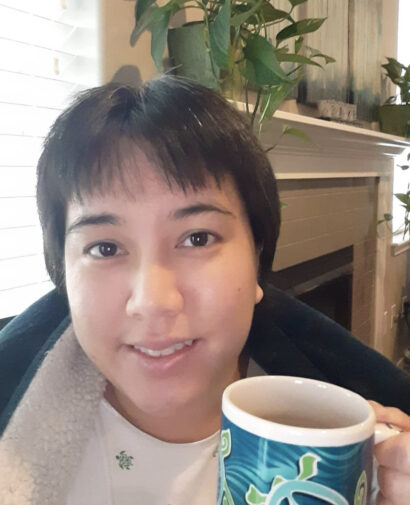Co-Creating the Warmth and Nourishment of Home
Bellingham Review is so excited to share with you a folio of poetry that emerged from the 50th Association for Ethnic Studies Conference at California State University, Los Angeles, in 2022. This poetry folio on home, nourishment, and community features the creative work of Shayda Kafai, María I. Morales-Sánchez, Nicole Leopardo, and Pau Abustan.
Poetry Introduction
These poems emerged from a panel presentation at the 50th Association for Ethnic Studies Conference at California State University, Los Angeles. The authors intended to put a presentation together that focused on our dreams of home and its many manifestations within our multidimensional lives. The poems were written and presented after several meaningful conversations between the authors about our winding, complex journeys toward finding “home.” To arrive toward this place, we discussed the consequences of the neoliberal academy, grind culture, white supremacy and ableism in our lives, and the feminist of color and queer disabled meaning-makers who have always guided our work. From this distinct and political location, our poems are led by ancestral wisdom and love. They sit in a luscious place of tension and growth, and illuminate how we rest, play, and dream despite the aggressive mandates of productivity. They serve as offerings that root us as interconnected and interdependent peoples.
"Disabled, Queer of Color Homecoming" Shayda Kafai (she/her/hers)
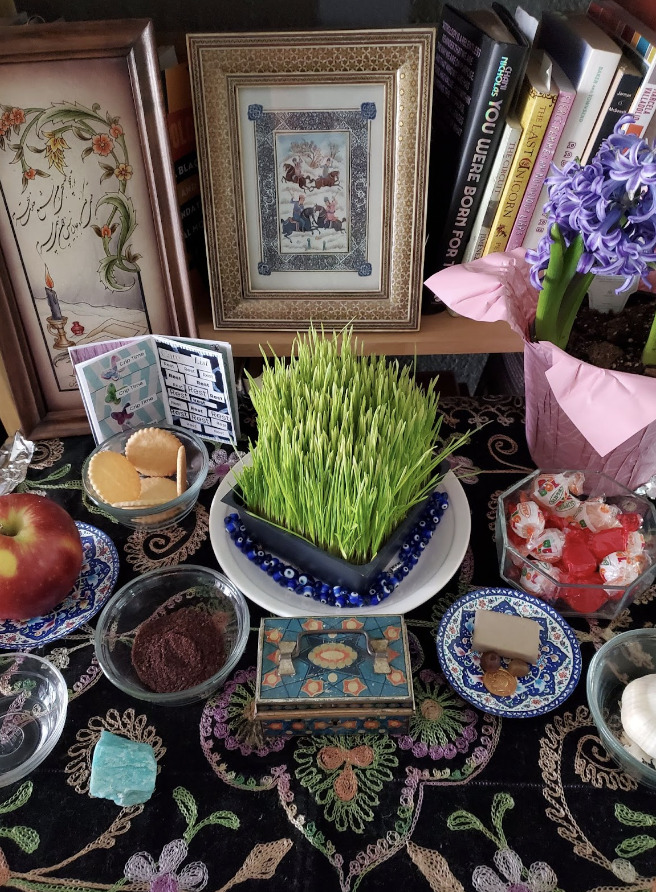
Image Description: A picture of a haft seen, a spring altar for the Iranian New Year. Against a suede tablecloth with embroidered, colorful flowers are little plates and bowls with cookies and candy for sweetness, an apple for beauty, garlic for health, coins for wealth, vinegar for patience, and somac for new beginnings. Green grass is at the center, a symbol of rebirth and growth. In the background of the altar are framed Iranian miniatures. This is my representation of home as love, as ritual. "Once we find each other, so much else becomes possible." –Sara Ahmed Home, a thick ball of wool: the clotted, and intergenerational. Trauma, my synonym for home, a two-syllable word for silence, for wide mouths, holes, and echo chambers. I found words to fill home when I found my people, fellow Mad, disabled, queer, and gender diverse community of color. More than words, they led me to earth knowings: the generative and the messy, the wisdom of moss, of mycelium networks that heal, the knowing that we are in relation with all that is around us. Together, from our disabled, queer femme beds, we are capacity. We re-name so much for ourselves. Home, the kindred and co-created. My disabled, queer of color community gave home roots, and what magic grew there. To feel held in joy, in the tender slow softness of home, I dig my hands into dirt, mail femme love letters full of stickers, I propagate plants. Home becomes what soothes, warm hands that hold. Home are the friends who uplift me, the queer, disabled students and colleagues who send me GIFs to cheer me up, and my love who always listens and holds. Home is the altar on my desk: Stacey Milbern, Audre Lorde, Gloria Anzaldua, Jerika Bolen, bell hooks. Home is amethyst, tiger’s eye, smoky quartz, and rainbow fluorite. It is a piece of pressed earth from Iran. It is movement, standing and falling out of a yoga pose only to stand up again, laughing. Home now is what my bones know. It’s the bottom of feet against gravel reminding me that I am tangible when dissociation tries to make me forget, the comfort of ritual and all its tenderness: my dog’s smile, new plant growth, naming our access needs in the classroom, and the bursts of glitter, stimmy joy when we find each other.
"A (sort of) letter to my childhood self" María I. Morales-Sánchez (she/her/ella)
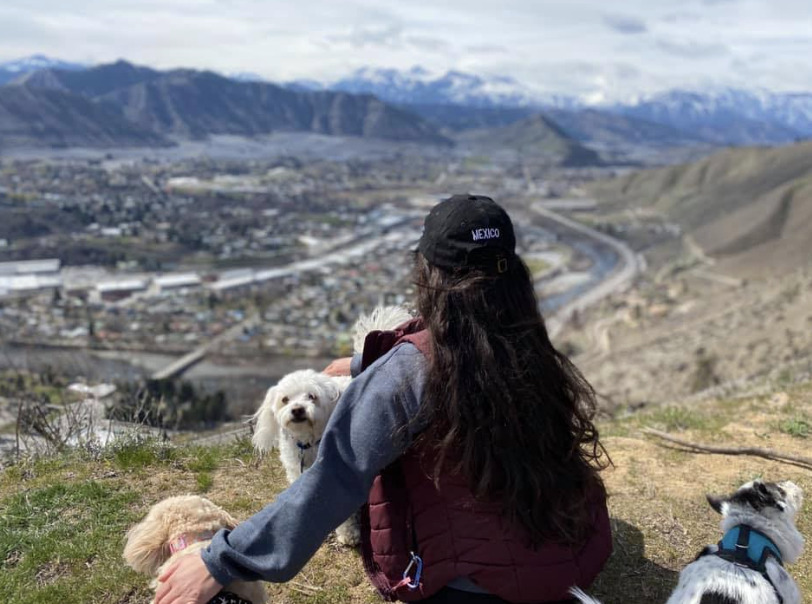
Image Description: A picture of Maria, brown femme with long hair, sitting on a grassy mountain top, back towards the camera, facing a valley which is the town of Cashmere, the Wenatchee River, and snowy mountains in the far distance. Maria is wearing a gray sweatshirt, a burgundy fleece vest, and a black cap with the words “Mexico” embroidered on the back. Her right arm is sitting on a small white poodle mix dog looking at the camera. Her left arm is stretched out to the left side and sitting on a light brown sheitzu mix dog with its back towards the camera. To the lower right corner of the photograph is another small dog, white with black spots wearing a blue harness also not facing the camera. Home is hope. Hope is sometimes a place like that vacated property behind our duplex where my young self found peace and calm. Like the tree in that place that offered me solace & its branches to climb high and far to escape the hurt of my every day. Where I learned to whistle not like a man but like a girl with so much to say. That place, its trees, open space, and dandelions rebellious like the adult I hoped to one day become, that place nurtured my sense of hope for a future where I would finally BE autonomous and whole, home is a place and hope is a gift from the divine. Home is prayer. An intention and connection. Connect to remember that we are not meant to be alone. We are kin. Prayers are release, to let go, to grow. To shed the garbage left on our bodies, inside and out by the “isms” meant to drain us of OUR rest, our will, hopes, and dreams. Galeano was right, without the right to dream “and the waters it gives us, the rest of the Rights would die of thirst.” Dear childhood self, thank you for dreaming, your dreams saved me. Home is prayer. In prayer I find myself and my radical being, again. There, I recapture my energy to cling to my dignity, and I refuse to forget that I was meant to be free. Prayer is a place. Where my ancestors join me in remembrance and in love There, they offer me gratitude for my resistant practices. I did the hard work to break the cycle, vital yes, and I am tired, so I pray, radically and with heart, four directions guide me, onward and up. A rupture in the capitalist machine and its tyranny of urgency. Home is still. I prayed myself into being the chingona I know I am today. Dear childhood self, you will find your voice, and no one will silence you again. Home is relationships that are lifegiving, tender, and many times loud like the carcajadas I share with friends, sound of wholesome joy- Joy is loud and takes up space. Home is food, Home is a pot of pinto beans, perfectly rolled tortilla on my right hand, a chile verde on my left. “Poor people’s food” they said with pride or shame so you can forget it is more goodness than the convenient “food” labeled american dream and progress, false narratives causing more illness than when we were actually poor. Maiz is home, the ancestral ranges of blues, purples, and reds—the true colors of my land, the land that birthed me and those before me, a memory that roots my identity. Home is las hiervas for my teas, the remedies, and limpias to keep spirit and body clean. Home is liberation. For me, for mi familia and for my ancestors-- women and men who carried the same ache, the shit I said “ya basta” to. To shed the cultural pain passed down and to honor the knowledge and resilience, I pray, MY way. Home is where I plant new seeds of possibility, I am more than a machine, a body for labor. Prayer sits in place, and sometimes it can’t sit, so I move like the prayers I offered in that place where I felt safe, barefoot because I believed and I hoped to feel the soil beneath my feet, belonging. Mine is a strongminded body moved by spirit, like dancing. Cumbias move me in all the ways, drums beat, I spin, you turn, we step, heart and soul alive. There, I am home. It took me sometime to arrive. It was one day at a time. One word at a time. I shed layers of skin, transformation hurts, but I have ganas, some passed down by women who fought back, their way. Generational knowledge sits in my body, it grounds me. The moon is my energy compass. The books are my weapons. A new voice found. Home is to reclaim, it is language to name la experiencia and connect. with. each. other. That is power. It took me some time to arrive, but I have. Dear childhood self, you will find your way home and there, you will be free.
"March 2023 Movements Toward Home" Nicole Leopardo (she/her/they)
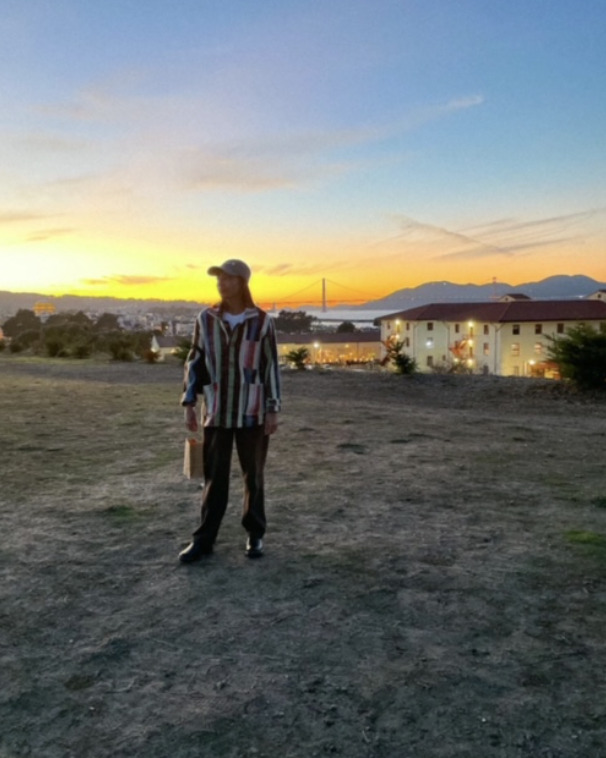
Image Description: Nicole, a brown femme with straightened hair, stands in a field of short beige grass and dirt, wearing a colorful striped chore jacket, brown pants, black clogs and a grey cap, and holds a small paper shopping bag. The golden gate bridge and bay melt into the sunset in the background; Nicole is not prominent in the picture because she fades into the vibrant orange sunset and dark field. The list below shares some ideas/things/actions that feel like home. As I engage in healing and re-defining the home I need and want for myself, I recognize that this list will shift and evolve as I grow, change, and learn. · Floating on my back in the ocean and looking up at the sky. · The questions: How do you feel today? What do you need? How can I support you? Did you eat yet? · “Go drink some water and be horizontal” · Telling my mom about a Black spider jumping into my coffee. It reminded us of the ways ancestors tell us things we need to hear. · Stealing damp mushrooms from a forest gnome and cooking them in a heap of butter. · Falling asleep on his chest while he rubs my eyebrow. · “She’s tender headed!” and the comforting cues of Black womanhood. · Men cooking specialized meals like the Cornmeal-crusted fried catfish that gracefully floats to the top or the dill grave the salmon rests in for three days or the spaghetti dinner splashed on the wall that will remain unseen. · Remembering that I have the power to break generational curses and re-define family dynamics. Remembering that this is brave and hard work. · A clear bag filled to the brim with large, swirly, salty black licorice, red and green sweet tubes, and random puffy pastel shapes that stick to my teeth. · The arrows and charts and misspelled words I scribble on a whiteboard. Throwing the plan out the window. The safe, messy spaces I co-create with my community. · The gendered, anxious pacing, frenetic energy that I’m learning to re-direct. Refusing to make this home and learning to do better. · The shuffling of his house shoes and the tattered top of mine. The vacuum ate it. · Throwing tomato paste into a boiling pot of water and dumping various heaps of seasonings in. Hope this works out. I trust my body to guide the way. · Smashing cloves of garlic on a wooden cutting board. Messes of garlic skin like abstract post-it notes. · Laying in the jungle in my living room. Pondering thrivance and liberation. · A thick bassline inviting my brain to play. · Full body exhaustion. Now what? · A fresh pot of coffee made with love in an early morning meditative state. · Conversations about the contradictions of existing under capitalism. · “Don’t lick the knife you could cut your tongue in half. You would look like a lizard. That happened to…” · Trying to keep cool while the systems around us fall apart. · Ancestral sightings in the form of butterflies and birds. · Licking the local honey off the knife before I put it in the sink. “Waste not want not.” · My body when I run. Fueled by sun and water. My limbs carried by music. · Slicing up a sweet potato and roasting it with olive oil. Feeling nourished. Nourishing others.
"Remembering and Re-Creating Home" Pau Abustan (they/siya)

Image Description: Photograph by Kavy Trujillo of a yellow and orange colored sunset near our home where Tongva and Chumash lands and oceans meet. Content notes: intersectional historical and ongoing systemic violences Home is… · Champurrado, warm chocolate sweet rice porridge, with a splash of milk and sometimes little fried crisp salty fishies for the extra crunch on top Home is… · Sitting in the garden with my grandpa Tatay Ino, thanking Creators for our earth, waters, aloe vera plant medicine, tangy healing zest of lemons and calamansi · Laughing and singing “I like bananas because they have no bones” with my grandma Nanay Miniang enjoying sweet and savory banana turon · Appreciating the original Dabs and Sons Marikina Philippines homemade clothes from my fashion artist grandparents Home is… · Tortang Talong eggplant omelet with ketchup and warm rice my mom cooked dipped in tenderness, love, and care after working two jobs · Fried tofu with soy sauce and garlic my dad whipped up alongside his illness and disabilities Home is… · My brother, sister, cousins, and I reading silently together at our local free air-conditioned library, cooking mac n cheese along with ramens from the box, and playing monopoly board games and Vigilante 8 on Play station all summer long, dreaming for the park and beach parentals promised us · Race for As as a child and then just trying to pass repeat college classes as an adult Home is… but shouldn’t be… · Screaming at each other to the top of our lungs · Storming out of the house · Wishing we weren’t family · Driving zig zags on the freeway unable to imagine a tomorrow · Wishing I didn’t have my bodymind and experience · Graffitied house, rats, mice, lice, roaches amok, gun shots, stabbings · Turning to my fur fam for solace and comfort ever since I was a child Home is... · Re-connecting, finding old, new, and soon to be queer, transgender, nonbinary, femme, and crip BIPOC kin and ancestors who “get me” who “hold me” · Cooking together, tasting deliciousness together · Crying and becoming angry about puti tears together · Dancing, singing, playing, laughing, goofing, oddballing · Reveling in our weird, mad, bad, messy, swirly, and imperfect pride · Animated storytelling (Animal Crossing, Wylde Flowers, Steven Universe, ATLA, LOK, Dragon Prince, Fruits Basket) · Bed world activisms led by fierce Queer Asian American Disabled Activists Home is… · Rest, Softness, Invitation, Belonging, Expansion, Ease, Comfy, Cozy, Community
Shayda Kafai (she/her) is an Assistant Professor of Gender and Sexuality Studies in the Ethnic and Women’s Studies department at California State Polytechnic University, Pomona. As a queer, disabled, Mad Iranian American femme, she commits to practicing the many ways we can reclaim our bodyminds from systems of oppression. To support this work as an educator-scholar, Shayda applies disability justice and collective care practices in the spaces she cultivates. Shayda’s writing and speaking presentations focus on intersectional body politics, particularly on how bodies are constructed and how they hold the capacity for rebellion. She is the author of Crip Kinship: The Disability Justice and Art Activism of Sins Invalid (Arsenal Pulp Press, 2021).
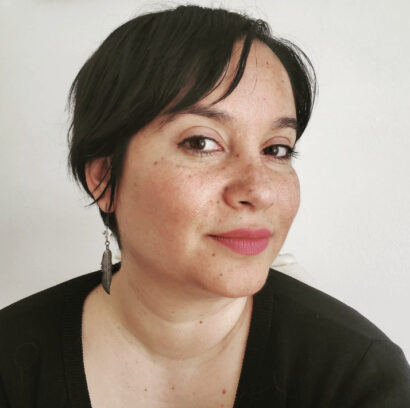
Dra. María I. Morales-Sánchez (she/her/ella) is a bicultural/bilingual queer Mexican-American daughter/granddaughter of farmworkers. She is currently serving as the director of the North Central Washington Educational Opportunity Center at Central Washington University in the Wenatchee campus. As an immigrant and the first in her large family to obtain a college degree, she is committed to culturally relevant and equitable access to educational opportunities for low-income youth and adults.
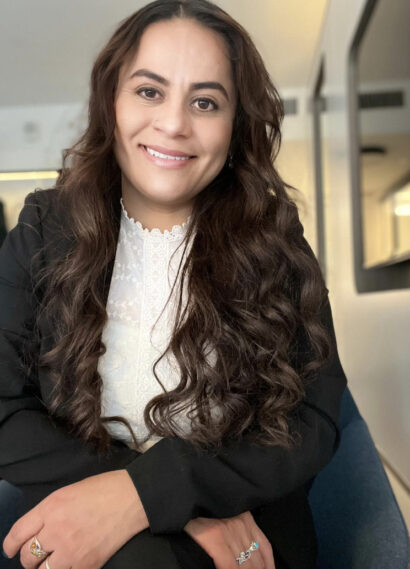
Nicole Leopardo (she/her/they) is an activist-scholar, and equity and inclusion strategist currently serving as Satellite Affordable Housing Associates’ (SAHA) inaugural Director of Equity and Inclusion in Berkeley, California. In this role, Nicole is stewarding both internal and community-focused Racial Equity, Diversity and Inclusion initiatives. As a former faculty in the historic College of Ethnic Studies at San Francisco State University, Nicole co-founded one of the first Critical Mixed Race Studies programs in the country. Nicole finds joy in conjuring up ancestral culinary delights, powerlifting, and participating in transformative, authentic dialogue.
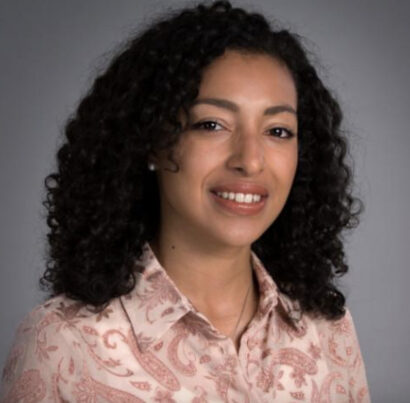
Dr. Pau Abustan (they/siya) is a queer, crip, gender fluid, Pilipinx Lucbanin Kapampangan scholar-activist-educator who centers queer critical race feminist disability justice worldmaking within youth learning, animated storytelling, and coalitional activisms. They are an Assistant Professor of Women’s, Gender, and Sexuality Studies at California State University, Los Angeles (Tongva lands).
